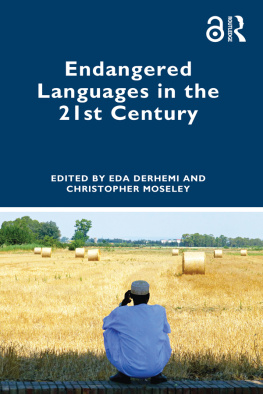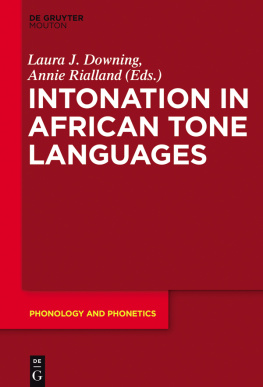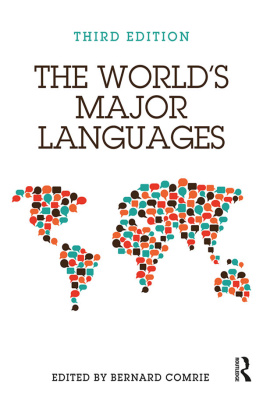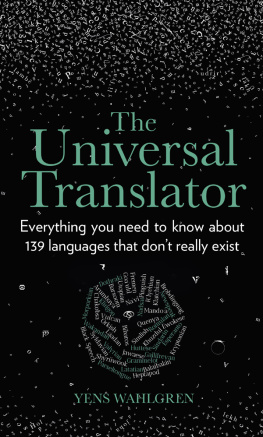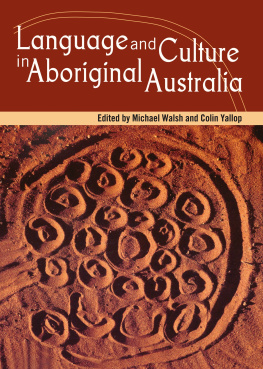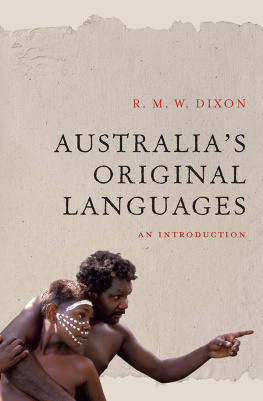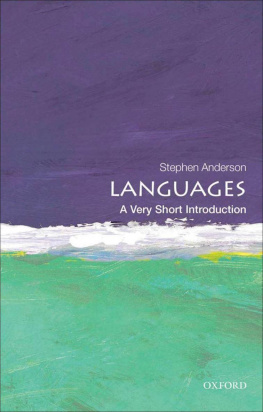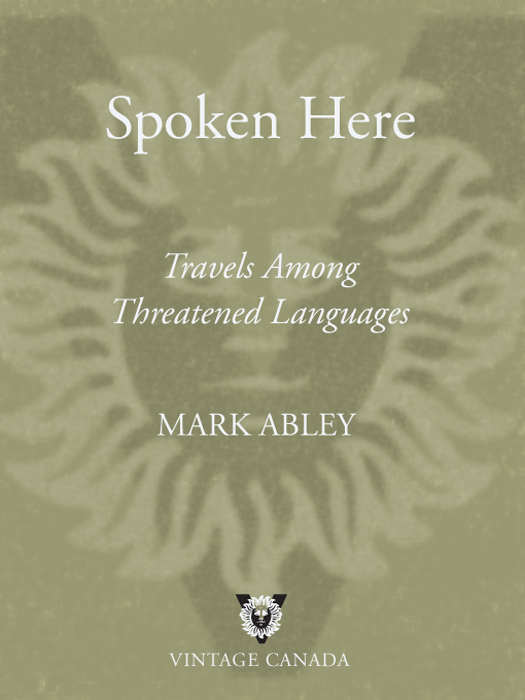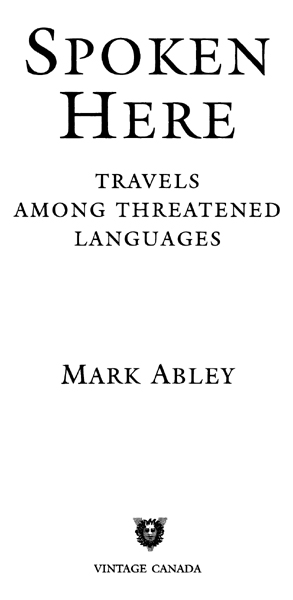Praise for Mark Ableys SPOKEN HERE
A splendid, original work. With Spoken Here as guide-book, the reader does not merely engage with languages, but with the people who speak them, the history of those people and the places in which these languages are spoken.
The Globe and Mail
Abley does his research and writes with the passion and understated eloquence of a concerned citizen of the world who hopes that something can be done to preserve the keystones to so many cultures.
San Francisco Chronicle
Chronicles his journey to Australia and the Isle of Man, to France, Oklahoma and around our country, in rich, elegiac detail, asking all along: What do we lose when the world loses another language?
National Post
If you instinctively inveigh against blandness and uniformity, this is an essential read.
The Guardian
As a bittersweet elegy for languages lost and a fascinating glimpse into the diversity of human expression, Spoken Here is a treasure. Part travelogue, part social history [it is] anecdotal and poetic yet equally heartfelt, partly because it conveys the wonder and joy of new discovery.
Toronto Star
A fascinating and at times moving account of how languages die. [A] brilliantly illuminating and unique language-travel book.
The Observer (London)
Spoken Here is a mix of travelogue, history, linguistics, journalism and finally agitprop on behalf of Babel. Books may be almost routinely described as important, but Mark Ableys Spoken Here truly is.
Sunday Herald (Glasgow)
A powerful and important book His celebration of linguistic diversity is compelling, his diagnosis of its demise devastating.
Sunday Times (London)
A fascinating and addictive book. It is more than that: it is a lucid, often eloquent, journey through the crumbling linguistic foundations of humanity.
Daily Telegraph (London)
The book is at once a plea for more conscientious diversity and an admonition that the Wests influence may already have metastasized beyond repair.
Village Voice
Abley made his career in daily journalism, and he moves us from one linguistic territory to another with great ease and a minimum of jargon. And a maximum of examples, often strange and touching.
La Presse (four stars)
A cri de coeur, passionately and convincingly argued. Vivid and often funny. So well-written and lively. Spoken Here should help to extricate this subject from the academic circles to which it has mostly been confined, and get it out into the wider world.
New Statesman (London)
Riveting Abley seems to have been everywhere and spoken to everyone Learned, thought-provoking, bouncing with ideas, yet funny and wry. Ableys passion for his subjects is inspiring.
Independent (London)
Fascinating and surprisingly hopeful.
Chicago Tribune
An uplifting experience for anyone with an interest in the wider world.
Sunday Times (South Africa)
Spoken Here is a well-written, timely, evocative book. Abley explicitly likens the extinguishing of humanitys linguistic heritage to the rapidly accelerating extinction of biological life forms. Although he knows of no force that can easily reverse this tide, Spoken Here abounds with examples of valiant resistance.
Ottawa Citizen
VINTAGE CANADA EDITION, 2004
Copyright 2003 by Mark Abley
All rights reserved under International and Pan-American Copyright Conventions. No part of this book may be reproduced in any form or by any electronic or mechanical means, including information storage and retrieval systems, without permission in writing from the publisher, except by a reviewer, who may quote brief passages in a review.
Published in Canada by Vintage Canada, a division of Random House of Canada Limited, Toronto, in 2004. Originally published in hardcover in Canada by Random House Canada, a division of Random House of Canada Limited, Toronto, and simultaneously in the United States by Houghton Mifflin, in 2003. Distributed by Random House of Canada Limited, Toronto.
Vintage Canada and colophon are registered trademarks of Random House of Canada Limited.
www.randomhouse.ca
National Library of Canada Cataloguing in Publication
Abley, Mark, 1955
Spoken here : travels among threatened languages / Mark Abley.
eISBN: 978-0-307-36823-2
1. Language obsolescence. 2. Language maintenance. I. Title.
P40.5.L33A25 2004 417.7 C2004-902492-2
The author is grateful for permission to quote from the poem Marsh Languages, from Morning in the Burned House by Margaret Atwood. Used by permission, McClelland & Stewart Ltd. The Canadian Publishers; and from the poem Lie Still, Sleep Becalmed, by Dylan Thomas, from Collected Poems, 19341952, copyright J.M. Dent & Sons. Reprinted by permission of David Higham Associates Ltd.
Portions of this book first appeared, in slightly different form, in Brick, Maisonneuve and the Times Literary Supplement.
v3.1
This book is for Annie
Hey now, you got me by the tongue
I feel like, theres nowhere I belong.
David Gray, Faster, Sooner, Now
The dark soft languages are being silenced:
Mothertongue Mothertongue Mothertongue
falling one by one back into the moon.
Margaret Atwood, Marsh Languages
O felix peccatum Babel!
J.R.R. Tolkien, English and Welsh
Contents
Patricks Language
A N OLD MAN watches a milky ocean roll in to the shore. High above the waterline, two children are skipping barefoot along an otherwise empty beach, its contours defined and guarded by a pair of mangrove swamps. A long, low island nudges the western horizon. This could be an afternoon scene on almost any tropical coast: the heat rising off the sand, a hawk scouring the sky. In fact, the surf is brushing a remote edge of northern Australia remote, that is, except to the old mans people, the Mati Ke, who may have lived in the area for tens of thousands of years.
One of the children pauses in her game. Among the fragments of driftwood and corrugated iron, the rusted fishing traps and crushed plastic bottles, she has found something different: a shell as long as her forearm. She looks up from the beach to the few scattered houses in the hamlet of Kuy. Then she calls to her grandmother, Mona, who is sitting as usual on a yellow foam mattress. Laid out on a verandah, the mattress gives a view of the sea.
The child uses her grandmothers language, Murrinh-Patha. Its also her own, and the daily language of a few thousand other people in the region. Most of its speakers live an hours rough ride away, in a town called Wadeye. The trip is possible only in a four-wheel-drive vehicle down a dirt trail that slithers inland through the silver-green bush, passing the corpse of a small airplane and fording the same creek twice before it links up with a gravel road that ends or begins in town.
Somewhere along that trail, as you skirt the treacherous pools of deep red sand or disturb a loud gathering of cockatoos, you pass a border. The border is no less real for its lack of fences, checkpoints, and customs officers. It marks the ancient division between the Murrinh-Patha land that includes the town of Wadeye and the Mati Ke land that includes the small outstation here at Kuy. In Aboriginal Australia, land and language are intimately related. Traditionally, the continent was defined and divided not only by its hills, creeks, and water holes but also by its hundreds of languages. Wadeye grew up in the 1930s as a Catholic mission, and the Mati Ke were one of several peoples who moved off their land and switched over out of a mixture of respect, convenience, and necessity to a daily use of Murrinh-Patha. They also learned English, so as to comprehend the noise of authority. At first, nobody realized that the Mati Ke language was slipping away.


